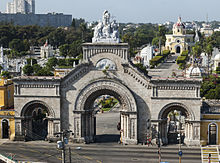
José Villalta Saavedra (born January 27, 1862, Havana, - died March 16, 1912, Rome) was a Cuban sculptor. One of the first native Cuban sculptors, Villalta was a mulatto born in Havana. Thanks to private patrons, he was able to train in Europe, first in Canarias (Spain) and then in la Reale Accademia di Belle Arti di Carrara. He worked in Italy and Cienfuegos.
Works
Villalta created several important Cuban monuments and statues, including the statue of José Marti located in Havana's Parque Central (Central Park) (dedicated February 24, 1905) and the monument to Cuban engineer Francisco de Albear. Villalta completed the Albear statue in Florence, Italy in 1893. The sculptor won a national competition to create a memorial to eight Cuban medical students executed in 1871 by Spanish colonial troops. It was completed in 1889, and it was the first monument made in Cuba by a Cuban artist.

In Havana's Necropolis Cristobal Colon (Christopher Columbus Cemetery), Villalta made the sculptures of the Virtues (Faith, Hope and Charity) above the main cemetery entrance and the religious relief sculptures around the cemetery walls. Villalta also created the monument at the most visited place in Necropolis Colon, the grave of Amelia Goyri de la Hoz , a woman known as "La Milagrosa" ("The Miraculous Woman" or "The Miraculous One"). An upper-class woman, she died in childbirth in 1901 at age 23, and her stillborn son was placed at her feet when she was buried. According to legend, when the grave was opened years later, her corpse was intact – a sign of holiness – and her son was nestled in her arms. Amelia is considered by many to be Cuba's unofficial saint. Cubans come to her grave every day to ask for children or love affairs. Villalta carved the sculpture out of one piece of Carrara marble, and he finished the work in 1902.
In his last years, he made the marble monument of Joaquín Albarrán, in Sagua La Grande, in 1910 and the monument dedicated to the martyrs, located in the Martyrs Park, in the city of Cárdenas, Matanzas Province, Cuba. The last one was placed in 1912, shortly after Villalta's death.

References
- ^ Aruca, Lohania; Menocal, Narciso; Shaw, Edward (1996). "The Cristobal Colon Cemetery in Havana". The Journal of Decorative and Propaganda Arts. 22 (Cuba Theme Issue). Florida International University: 36–55. doi:10.2307/1504146. JSTOR 1504146. OCLC 61496559.
- ^ "Sculptures in Cuba". Galeria Cubarte. 2006. Archived from the original on 2007-02-24. Retrieved 2007-10-27.
- ^ "The Miraculous Woman". Cuban Traditions. Retrieved 2007-10-27.
- Gjelten, Tom (2004-10-07). "La Milagrosa, Cuba's Unofficial Patron Saint" (audio). Day to Day. National Public Radio. Retrieved 2007-10-27.
- Veigas Zamora, José (2005). Escultura en Cuba: Siglo XX. Editorial Caguayo y Editorial Oriente, Santiago de Cuba. ISBN 959-11-0425-1.
This biographical article about a Cuban sculptor is a stub. You can help Misplaced Pages by expanding it. |